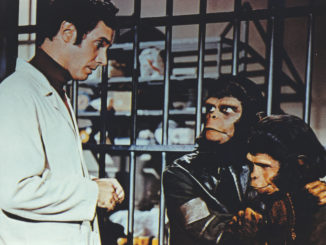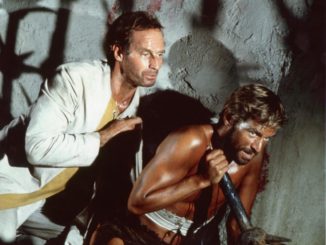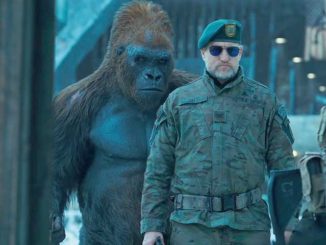Die Überraschung des Sommers dürfte zweifelsohne RISE OF THE PLANET OF THE APES sein. In einer vorrangegangenen News schrieb ich, dass sich zum damaligen Zeitpunkt keinerlei Hype entwickelte. Die Trailer und Filmclips wurden zwar beachtet, aber schienen an den Massen vollkommen vorbeizuziehen. Erst die massiven positiven Reviews kurz vor Kinostart schienen das Ruder herumzureißen. Der Film ist ein Hit! Beim Publikum UND bei den Kritikern (und ja, der Film bewies endlich einmal, dass ein Sommer-Blockbuster keine 50 millionen Dollar Werbebudget braucht – gute Kritiken sind immer noch die beste Werbung!). Mit Produktionskosten von gerade einmal 95 Millionen Dollar (und ja, mit dem Budget haben sie diese Effekte hinbekommen…), spielte der Streifen bereits nach einer Woche 120 Millionen Dollar ein. Als Fan der Original-Saga freut mich dies ungemein – und ja, auch ich komme nicht drumherum jedem Fan des phantastischen Films, dieses Werk ans Herz zu legen. Ab ins Kino!
Nun hat Regisseur Rupert Wyatt angekündigt, dass ZWEI Fortsetzungen folgen werden. Der Inhalt dürfte klar sein – im Grunde ist ja bereits der Filmtitel ein reiner Spoiler: die Affen werden die Macht an sich reißen. Doch der Weg zur Machtübernahme ist unbekannt…
Im Originalfilm von 1966 war dies klar: nach einem globalen Atomkrieg setzte eine neue Evolution ein. Ergebnis: der Primat überholte den Homo Sapiens. Teil 2 blieb bei dieser Hintergrundgeschichte. Da im zweiten Teil der Planet Erde ein weiteres Mal in die Luft gejagt wurde, die Filmreihe aber zu erfolgreich gewesen ist, um sie zu beenden, entschied man sich ein ontologisches Paradoxon zu kreieren. Zeitreise – in die damalige Gegenwart – und so sponn man eine neue Origins-Story zusammen, in der die vom Menschen trainierten Affen eben diesen den Krieg erklären und somit den Untergang des Homo Sapiens einläuten. In den Grundzügen basiert RISE OF THE PLANET OF THE APES somit auf dieser Idee (um genau zu sein auf Teil 4, EROBERUNG VOM PLANET DER AFFEN). 2001 kam das erste Remake in die Kinos – Tim Burtons Action-Kracher, der aber in keinerlei inhaltlicher Verbindung zu irgendeinen anderen Affen-Film steht. Da wir bei RISE somit de facto ein Reboot haben (kein Prequel – da er sich auf keinerlei anderen Film bezieht und auch nicht wirklich ein Remake ist, da er ganz andere Wege beschreitet als Teil 4), kann alles passieren…
Rupert Wyatt hat nun seine Überlegungen zu den möglichen Fortsetzungen SEHR ausführlich öffentlich ausgebreitet – für Affen-Fans zweifelsohne Wert gelesen zu werden…
Our story is told in a microcosm, but we need to be aware of the world at large. To do that in such a way that in the next film you’ll understand how things have changed.
So the great thing is you can have the next generation of apes who have grown up within the paradise they find [at the end of the first film]. You can have a new generation evolve who have inherited the genes, and they’re the ones that are going into battle; they are the ones displaying real fear as young soldiers when they’re going into battle. Think Full Metal Jacket… that kind of urban environment not dissimilar to Western forces going into Baghdad. Remember when the soldiers were finding gold telephones in Hussein’s home? It would be the same way that the apes would understand our species through what we’ve created — whether it be TV or cooking or whatever it may be.
There’s so much we can do, whereas the story of the first film plays out as a fairy tale, the next film will play out as a Shakespearean scifi drama where you’ll have Caesar as the leader of this revolution, but Koba would be the one leading his own troops wanting to wipe out humans in a genocide. But Caesar is more conflicted, and maybe Caesar needs Koba’s assistance in terms of the conflict. And Maurice is his advisor and he’s telling him to combine forces. Caesar needs the allegiance of the two, although he doesn’t believe in what Koba believes in, which is complete genocide.
The question is where does Will Rodman fit into a sequel, if at all? The relationship between father and son is so strong, so it’s a possibility. But you could always portray the human face through that of a resistance leader or the guy who is trying to find a cure for the virus [that’s killing humans]. Maybe it’s a little bit like 12 Monkeys, where every human has gone underground to avoid the virus, and when they come up to the surface they’re wearing gas masks. In a way, that would de-humanize them and would make us really follow the apes. That’s what interests me. This shouldn’t be apes as our enemy, this should be about the idea of a whole new civilization coming into being. With the beauty of modern cinema, we, the audience, have an opportunity to witness that.
One thought that has to be kept in mind is that even in the original film series, the audience was pretty much cheerleaders on the side of the apes. „Well, they’re a mirror to ourselves, and the mythology is so great. It’s like a primal instinct in us to kind of look at them and think, ‚Do they have a soul? Do they think like us? And if they do, what are they thinking?‘ This franchise, this story, tells us how they are thinking.
Trilogie – immer her damit. Und wenn dann am Ende die Welt untergegangen ist, gleich eine weitere Trilogie, die in der Heston-Ära ansetzt…
‐ Markus Haage






